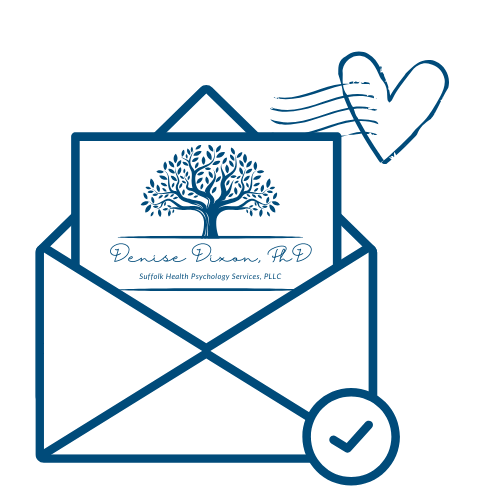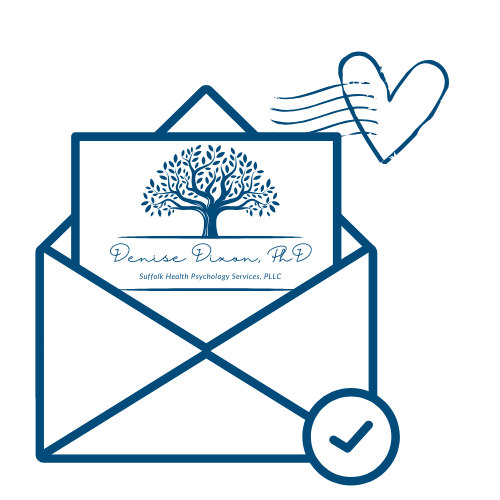HOPE. STRENGTH. GROWTH.
Suffolk Health Psychology Services, PLLCDenise Dixon, PhD, Licensed clinical health psychologist
Social Media Policy
Please read through this page to understand how the practice uses the Internet and Social Media.
If you have any questions about anything on this page, please bring them up during any of our face-to-face sessions. As new technology develops, and the Internet changes, there may be times when the practice will need to update this policy. You will receive any policy changes in writing, and all policies are posted on this practice website.
Friending
Following
I have recently launched a blog on the practice website. In addition, I post psychology news on Spoutible. None of my patients are under any obligation to follow my blog or Spoutible stream.
Please be aware that if you elect to follow my blog or Spoutible stream, and if you use an easily recognizable name on Spoutible, then we may briefly discuss the potential impact on our professional relationship.
Again, I remain committed to protecting the privacy of all of my patients. Therefore, I strongly recommend that patients elect private ways to follow me on Spoutible, such as using an RSS feed, or a locked Spoutible list. These steps would eliminate the public link to my content.
Of course, all patients are welcome to use their own discretion in choosing whether (or not) to follow me.
Please note that I will not follow any patients back. I do not follow patients on blogs, or Spoutible. The practice asserts that casual viewing of patients’ online content outside of the therapy hour may create confusion regarding professional boundaries. In addition, viewing the online activities of patients without express consent and without a specific purpose could potentially negatively effect our professional relationship.
Of course, all patients are welcome to share aspects of his or her online life, during face-to-face sessions.
Fanning
I maintain a Facebook Page for my professional practice to allow people to share my blog posts, podcasts, and practice updates with other Facebook users. All of the information shared on that page is available on my website.
You are welcome to view my Facebook Page and to read or share articles, podcasts, etc., posted there. However, please know that I do not accept past or current patients (hereto simply referred to as “patients” to represent all past, current and potential future patients) as Fans of this Page, due to my commitment to protecting patient confidentiality. I state very clearly on this page that any one whom views my Facebook page will not discover the names of any of my current or past patients listed as a Fan.
The American Psychological Association’s (A.P.A) Code of Ethics prohibits psychologists from soliciting testimonials from patients. The term “Fan” may infer an implied request for a public endorsement of the practice.
Please note that, if you so desire, you may elect to subscribe to the practice Facebook page via RSS without becoming a Fan, and therefore, without creating a visible, public link to the practice Facebook page.
Google Reader
I do not follow patients on Google Reader. I do not use Google Reader to share articles. If you want to share items relevant to your treatment, I encourage you to upload them to your patient portal, so that we may discuss during your next session.
Interacting
Please do not use SMS (mobile phone text messaging) or messaging on Social Networking sites (such as Instagram, Facebook, or LinkedIn), to contact me. These sites are not secure, and I may not read these messages in a timely fashion.
Please do not use Wall postings, “@replies,” or other means of engaging with me in public online, at any time. Public telecommunication compromises your confidentiality and privacy. These exchanges have the potential of becoming a part of your legal medical record, which need to be documented and archived in your practice chart.
If you need to contact me between sessions, the best way to do so is via the practice secure patient portal.
I prefer using email only to arrange or modify appointments. Please do not email me content related to your therapy sessions, as any email (that does not use the secure patient portal) is not completely secure or confidential. If you choose to communicate with me by email, be aware that all emails are retained in the logs of your and my Internet service providers. While it is unlikely that someone will be looking at these logs, they are, in theory, available to be read by the system administrator(s) of the Internet service provider. You should also know that any emails I receive from you and any responses that I send to you become a part of your legal record.
If you need to contact me between sessions, the best way to do so is via the practice secure patient portal.
Use of Search Engines
It is NOT a regular part of my practice to search for patients on Google, Facebook, or other search engines. Rare exceptions may be made during times of crisis.
If I have a reason to suspect that you are in danger, and you have not been in touch with me via our usual means (for example, by attending your online appointments, or via phone, or email), then I may elect to use a search engine (to find you, find someone close to you, or to check on your recent status updates) as a necessary means to ensuring your safety. However, such circumstances are highly unusual, and if I ever determine such means necessary, I will fully document and then discuss the events with you during our next contact.
Business Review Sites
You may find my psychology practice on sites such as Yelp, Healthgrades, Yahoo Local, Bing, or other places that list businesses. Some of these sites include forums in which users rate their providers and add reviews. Many of these sites comb search engines for business listings and automatically add listings regardless of whether the business has added itself to the site.
If you should find my listing on any of these sites, please know that my listing is NOT a request for a testimonial, rating, or endorsement from you as my patient. The American Psychological Association’s Ethics Code (Principle 5.05) stipulates the solicitation of testimonials as unethical for psychologists: “Psychologists do not solicit testimonials from current therapy clients/patients or other persons who because of their particular circumstances are vulnerable to undue influence.”
Of course, you have a right to express yourself on any site that you so desire. However, due to confidentiality, I will not respond to any review on any of these sites, whether positive or negative. I urge you to take your own privacy as seriously as I take my commitment of confidentiality to you.
You should also be aware that if you are using these sites to communicate indirectly with me about your feelings about our work, there is a good possibility that I may never see it. If we are working together, I hope that you will bring your feelings and reactions regarding our work, directly into the therapy process. This represents an important part of therapy, even if you decide we are not a good fit. Of course, you are free to share that you are in therapy with me wherever and with whomever you like. Confidentiality means that I cannot tell people that you are my patient, and my Ethics Code prohibits me from requesting testimonials. But you are more than welcome to tell anyone you wish that I’m your therapist or how you feel about the treatment I provided to you, in any forum of your choosing.
If you do choose to write something on a business review site, I hope you will keep in mind that you may be sharing personally revealing information in a public forum. I urge you to create a pseudonym that is not linked to your regular email address or friend networks for your own privacy and protection.
Conclusion

Denise Dixon, Ph.D.
Licensed clinical health psychologist
Dr. Dixon is a licensed clinical health psychologist that provides support to children, adolescents, and adults, and focuses on evidence-based approaches to address a range of mental health challenges. With a deep commitment to empowering individuals, she helps them discover hope, tap into their inherent strengths, and nurture their personal development.
Dr Dixon is in-network with Aetna & Anthem (BCBS) in select states, and can help clients with reimbursement for out-of-network benefits. The practice offers evaluations and treatment for Workers' Compensation, as well as unbiased, third-party Independent Medical Examinations for Mental and Behavioral Disorders (M&BD IME's).
Schedule my appointment
Visit the patient portal to set up your HIPAA-compliant private account. You may then complete your new patient paperwork, enter payment information, and schedule your first appointment – all from the privacy and convenience of your own home!


